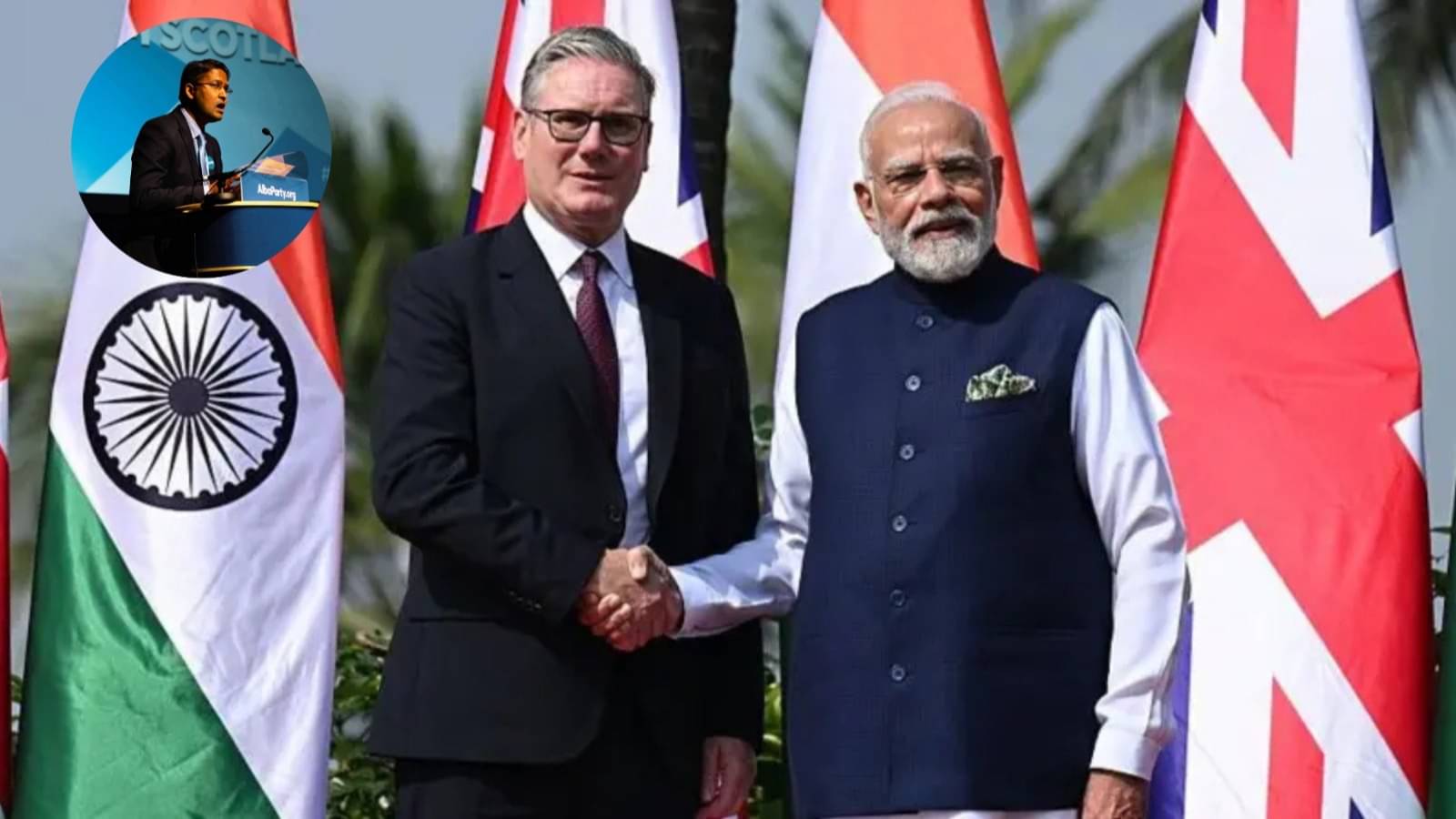India-UK Trade Deal: Scotch Whisky and Strategic Ties in Focus | Image:
X
New Delhi: In a visit that marks a new chapter in an old relationship, British Prime Minister Sir Keir Starmer concluded his first official trip to India, aiming to transform a historic trade agreement into tangible economic benefits for both nations.
The visit, centred on the landmark UK-India Comprehensive Economic and Trade Agreement (CETA), signals a strategic alignment that places India’s growing economic muscle and Scotland’s iconic whisky industry at the heart of a renewed partnership.
Dhruva Kumar comments that the two-day summit in Mumbai between Starmer and Indian Prime Minister Narendra Modi has set an ambitious target: doubling bilateral trade to approximately $112 billion by 2030. This push comes just months after the deal was signed in July 2025, an agreement the UK government touts as the best any country has ever secured with India.
A “Transformative” Deal for Scotch Whisky
The most immediate and dramatic impact of the agreement is on the Scotch whisky industry, a cornerstone of the Scottish economy. India, the world’s largest whisky market by volume, has long been a target for Scotch producers hampered by a prohibitive 150% import tariff.
The Comprehensive Economic and Trade Agreement, CETA slashes this barrier, immediately cutting the tariff by half to 75%, with a planned reduction to 40% over the next decade. This change is projected to unlock up to £1 billion in annual Scotch exports to India, providing a massive boost to distillers and bottlers across Scotland and creating over 1,000 new jobs in the UK.
“The UK–India Free Trade Agreement will open up access to the world’s largest whisky market in the years to come,” said Mark Kent, Chief Executive of the Scotch Whisky Association, which joined the Prime Minister’s trade mission. The industry has hailed the deal as “transformative,” with the potential to grow the Scottish economy by £190 million a year.
For Indian consumers, this means iconic brands like Johnnie Walker, Glenfiddich, and Chivas Regal will become significantly more affordable, moving from luxury indulgences to accessible premium products.
Wider Economic Windfalls for the UK and India
Former MP Candidate from Scotland, Prof Dhruva Kumar, comments, the benefits of the new partnership extend far beyond spirits. The UK government estimates the trade deal will:
- Increase UK GDP by £4.8 billion each year.
- Boost UK wages by £2.2 billion annually.
- Increase bilateral trade by £25.5 billion per year by 2040.
The visit itself generated immediate economic momentum, with the UK government announcing £1.3 billion in new Indian investments, creating nearly 7,000 new jobs across the United Kingdom. Key investments include:
- TVS Motor Company: A £250 million investment in Solihull to develop next-generation electric vehicles, creating 300 jobs.
- Cyient: A £100 million investment to boost innovation in semiconductors and clean energy, creating 300 UK jobs.
- Mastek: A new AI and Experience Centre in London and Leeds, generating 200 skilled roles.
For India, the deal slashes average UK tariffs on its goods—such as clothing, footwear, and food products, providing its massive manufacturing sector with greater access to the British market. The agreement also grants UK businesses unique access to India’s vast public procurement market, valued at approximately £38 billion annually.
The Geopolitical Backdrop: A Strategic Recalibration
The accelerated finalisation of this deal, following over three years of negotiations, reflects a strategic recalibration by both nations in an uncertain global landscape.
For the UK, the agreement is the most significant trade pact since leaving the European Union, a tangible demonstration of its “Global Britain” ambitions. It also offers an economic buffer for UK industries, like automotive and alcohol, that have been affected by recent US trade tariffs.
For India, strengthening ties with the UK is part of a broader strategy of engaging with Western economies to integrate into resilient new supply chains and attract technology transfer. This is particularly salient as the EU—another key partner—has suspended tariff preferences for India, putting it at a disadvantage compared to competitors like Vietnam and Bangladesh.
Beyond Trade: Defence, Tech, and Soft Power
The Starmer-Modi talks went far beyond goods and services, deepening cooperation in critical strategic areas:
- Defence: The two nations signed a £350 million (approximately $468 million) contract for the UK to supply India with Lightweight Multirole Missiles, a deal that also secures 700 jobs at a factory in Northern Ireland. This paves the way for a broader “complex weapons partnership”.
- Technology: Both leaders reaffirmed their commitment to a “Technology Security Initiative,” launching joint centres for AI and 6G research, and a Critical Minerals Processing Guild to diversify supply chains.
- Education & Culture: The UK is set to become the country with the largest higher education footprint in India, with nine universities, including Lancaster and Surrey, opening campuses. A new deal was also announced to facilitate the production of Bollywood films in the UK.
A Partnership Centred on Future Growth
As Prime Minister Modi noted, there is a “new energy” in India-UK ties . The CETA is more than a trade deal; it is the foundation of a comprehensive strategic partnership between two major economies that see mutual opportunity in alignment.
For Scotland, it offers a historic chance to embed its most famous export into the daily life of the world’s largest market. For India, it is a gateway to greater investment, technology, and global influence. As both prime ministers celebrated the “upward trajectory” of their relationship, the Mumbai summit proved that in geopolitics and trade, old bridges can indeed carry very new and heavy traffic.
ALSO READ: Zoho’s Viral Surge: A Defining Moment for India’s Digital Self-Reliance

